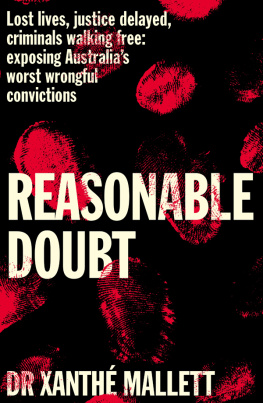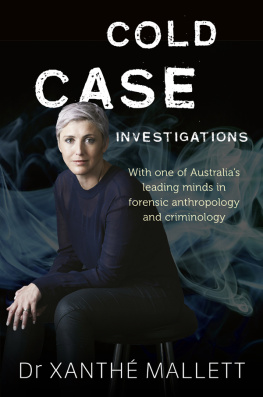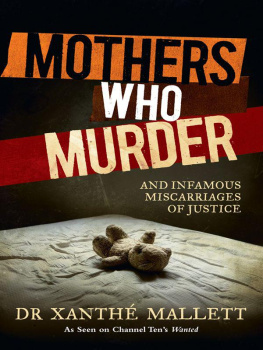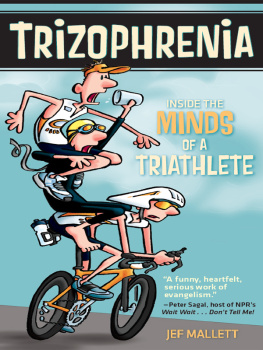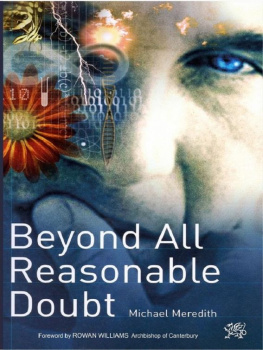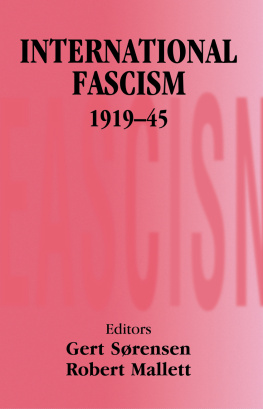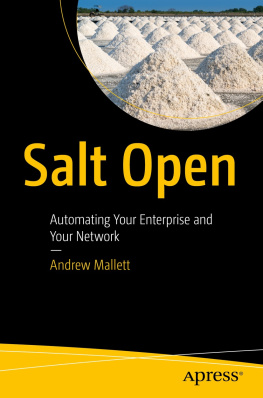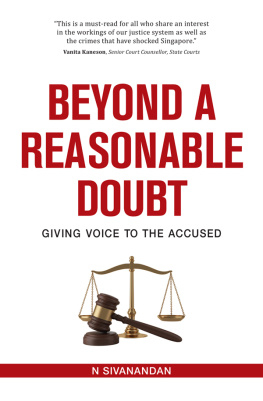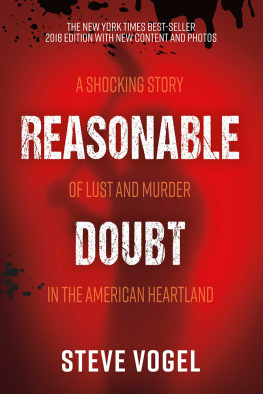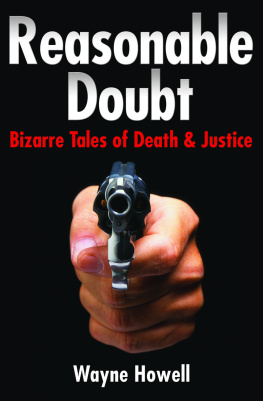Xanthé Mallett - Reasonable Doubt
Here you can read online Xanthé Mallett - Reasonable Doubt full text of the book (entire story) in english for free. Download pdf and epub, get meaning, cover and reviews about this ebook. year: 2020, publisher: Pan Macmillan Australia, genre: Detective and thriller. Description of the work, (preface) as well as reviews are available. Best literature library LitArk.com created for fans of good reading and offers a wide selection of genres:
Romance novel
Science fiction
Adventure
Detective
Science
History
Home and family
Prose
Art
Politics
Computer
Non-fiction
Religion
Business
Children
Humor
Choose a favorite category and find really read worthwhile books. Enjoy immersion in the world of imagination, feel the emotions of the characters or learn something new for yourself, make an fascinating discovery.
- Book:Reasonable Doubt
- Author:
- Publisher:Pan Macmillan Australia
- Genre:
- Year:2020
- Rating:5 / 5
- Favourites:Add to favourites
- Your mark:
- 100
- 1
- 2
- 3
- 4
- 5
Reasonable Doubt: summary, description and annotation
We offer to read an annotation, description, summary or preface (depends on what the author of the book "Reasonable Doubt" wrote himself). If you haven't found the necessary information about the book — write in the comments, we will try to find it.
Reasonable Doubt — read online for free the complete book (whole text) full work
Below is the text of the book, divided by pages. System saving the place of the last page read, allows you to conveniently read the book "Reasonable Doubt" online for free, without having to search again every time where you left off. Put a bookmark, and you can go to the page where you finished reading at any time.
Font size:
Interval:
Bookmark:

The good, bad and downright rotten parts of Australias criminal justice system are put on trial by Dr Xanth Mallett. With her clear-eyed logic and objectivity, this compelling book identifies reasonable doubts which must keep prosecutors and defence lawyers awake at night. Hedley Thomas, host of the Teachers Pet podcast
We all put our faith in the criminal justice system. We trust the professionals: the police, the lawyers, the judges, the expert witnesses. But what happens when the process lets us down and the wrong person ends up in jail?
Henry Keogh spent almost twenty years locked away for a murder that never even happened. Khalid Baker was imprisoned for the death of a man his best friend has openly admitted to causing. And the exposure of Lawyer X Nicola Gobbos double-dealing could lead to some of Australias most notorious convictions being overturned.
Forensic scientist Xanth Mallett is used to dealing with the darker side of humanity. Now shes turning her skills and insight to miscarriages of justice and cases of Australians who have been wrongfully convicted.
Exposing false confessions, polices biases, misplaced evidence and dodgy science, Reasonable Doubt is an experts account of the murky underbelly of our justice system and the way it affects us all.

For all those who have been falsely accused, their families, and others who have suffered due to failings of the criminal justice system. Your stories should not be forgotten.
It is better 100 guilty persons should escape than that one innocent person should suffer.
Benjamin Franklin
Murder victims, sexual assault victims, victims of family violence. All of these and many more come to mind when we think about who is harmed by violent crime.
But victimisation can also occur at the hands of the system established to mete out justice when people break the law by falsely accusing innocent people; when this happens miscarriages of justice occur.
A miscarriage of justice is the failure of the judicial or court system to attain justice. There are many types of miscarriages of justice, one of which is a wrongful conviction, a term that relates to individuals who are factually innocent of the crimes for which they have been convicted. Wrongful convictions happen for many reasons, but common causes are false or coerced confessions, mistaken eyewitness identifications, lying witnesses, lack of disclosure, or poor professional practice by the police, legal counsel or forensic experts. Forensic evidence can also be contaminated, introduced or misinterpreted, which can also lead to wrongful convictions. A combination of these can occur within one case.
The implications of these influences couldnt be more profound, not just for the person wrongly convicted, but for everyone, as we all want to have faith that our justice system is founded on fairness and transparency. Sadly, sometimes that simply isnt the reality.
Consider the infamous Birmingham Six case in the United Kingdom, when six Irishmen were sentenced to life imprisonment following their false confession to planting bombs in two Birmingham pubs, which killed 21 people and injured 182 in November 1974. This was the worst peacetime atrocity on English soil in terms of people killed and injured until the 7 July bombings a series of coordinated suicide terrorist attacks in London in 2005, in which 52 people were killed (plus the four bombers) and a further 784 injured.
The men had links to the Provisional IRA, a terrorist organisation, which led to the police making assumptions about their guilt. So once in the custody of police, the six were allegedly beaten and deprived of food and sleep and even subjected to a mock execution because the police believed they had their offenders; a theme, sadly, you will see repeated in the cases we will cover in this book.
Four of the six confessed under duress, and in May 1975 all were charged and found guilty of murder and conspiracy to cause explosions. The men later withdrew their coerced confessions, and all six maintained their innocence going forward. In 1991, after significant interest in the case from various media groups questioning the safety of the convictions, the case was referred back to the Court of Appeal. On the basis of police fabricating and suppressing evidence, as well as the unreliability of the confession evidence, the appeal was granted and on 14 March 1991, the Birmingham Six walked free. The Court of Appeal stated that three former detectives had lied to achieve the convictions.
Clearly, this miscarriage of justice was a horrendous experience for the Birmingham Six, who lost more than 16 years of their lives for crimes they did not commit.
Equally appalling, the real mass murderers who were responsible have never been brought to justice. As things stand, the many families impacted by this act of terror will never see anyone prosecuted for these crimes.
In numerous ways, the Birmingham Six case highlights many of the core themes that lead to miscarriages of justice occurring: police going down investigative rabbit holes, unreliable or fabricated evidence, and coerced confessions amongst them.
Sadly, this type of injustice is not limited to Britain, and we will see, as we go through the cases in this book, how reflections are seen within the Australian criminal justice system.
The cases we will look at are not isolated incidents of incompetence or mishandling. They represent systemic failures of our criminal justice system.
We dont seem to be able to learn from our mistakes.
We mostly forget about the wrongly accused and convicted when we think about victims of crime, but in this book I want to highlight some of their stories, because if it happened to them it could happen to anybody. We need to be more open minded when it comes to our blind acceptance that the criminal justice system always gets this right. Because it doesnt.
I wrote about Lindy Chamberlain (now Chamberlain-Creighton) when I published a book on mothers accused of murdering their own children, and Lindy is surely the poster child when we consider people who are wrongly accused. My university students, many in their early 20s, dont know Lindys name, but they certainly know the story. Lindy and her husband Michael were holidaying at Uluru in August 1980. On the evening of 17 August, Lindy put nine-week-old Azaria to bed in a tent with Azarias brother Reagan at about 8pm, before Lindy returned to the group of other campers gathered around the barbeques.
A short time later, the group heard a babys cry from the direction of the tents, and Lindy rushed over to check on her sleeping children. She then uttered what has become an infamous cry: My God, the dingos got my baby! Azaria vanished that night, and was never seen again. Her body was never recovered.
This was just the start of the horror for the Chamberlains. The police did not believe Lindy and Michaels account, and instead the mother found herself at the centre of one of Australias most infamous murder trials. She was tried and found guilty of murder on the basis of flawed expert forensic evidence and was sentenced to life imprisonment. Michael was found guilty of being an accessory after the fact. Lindy spent over three years in prison all for a crime that never happened. She was only released in 1986 when a piece of Azarias clothing happened to be found near a dingos lair. All of Lindy and Michaels convictions were subsequently quashed by the Court of Appeal in 1988.
Font size:
Interval:
Bookmark:
Similar books «Reasonable Doubt»
Look at similar books to Reasonable Doubt. We have selected literature similar in name and meaning in the hope of providing readers with more options to find new, interesting, not yet read works.
Discussion, reviews of the book Reasonable Doubt and just readers' own opinions. Leave your comments, write what you think about the work, its meaning or the main characters. Specify what exactly you liked and what you didn't like, and why you think so.

